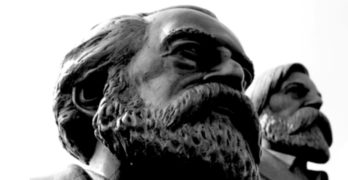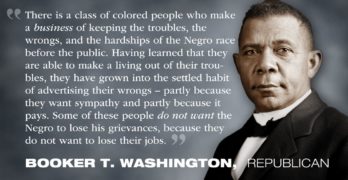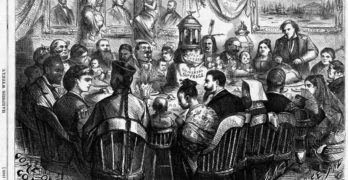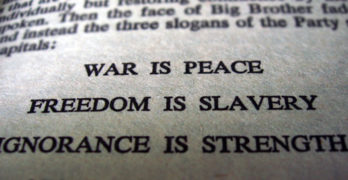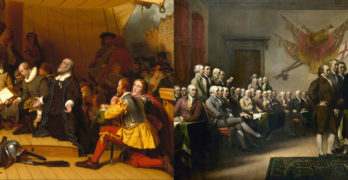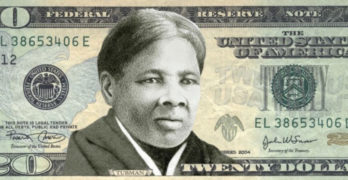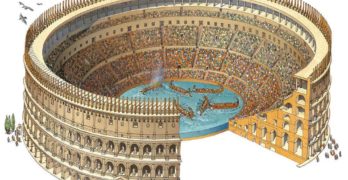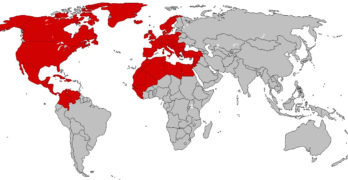
Historians believe America did more in its first two hundred years than had been achieved in the previous six thousand years of recorded history. The American Republic was to ensure a just and “level playing field” for production and commerce and to allow people to provide for themselves with their own initiative and resourcefulness. This worked better than any economy in world history until the crash of 1929.
Until the 1930s, the American federal government never had a mandate to provide for individual needs. In the American Republic, the government was designed for a strong and resourceful people, not a dependent one. It was the people’s servant, existing to defend them, their rights, and property, not to make them dependent on the government for their provisions.
In contrast, under Marxism, the government is the people’s god whom they must trust and give allegiance to for all their provisions and needs. Karl Marx identified America as the chief enemy of Marxism. He believed socialism could not prevail until America and all Western-style republics were destroyed. At the time, America was by no means the most powerful nation. Yet Marx especially focused on the American Republic because he perceived it to be the source of increasing human freedom and an increasingly powerful free-market economy, which Marxism could not compete with.
When you study the history of impoverished nations, you are going to find a Marxist-communistic restrictive and oppressive government system. The governments we live under have a vital role in the freedoms we enjoy.
That’s why countries that have Marxist-communistic governments that deny people the right to be human, and the freedom to make choices and don’t value human life are deeply impoverished nations. Marxism imposes a unity of conformity where individual expression becomes a threat to the state, which can bring swift and severe punishment and, of course, silence all creativity and innovation. These are spiritual governments people live under and they all operate under the kingdom of darkness which holds them in slavery to a life that lacks opportunity.
A mirror from the past indicates nations and empires have “life cycles.” Many historians have studied this throughout the years, and all have come to the same conclusion: a lifetime of about two centuries.
America developed into thirteen colonies, then into the strong 50 states she is today. When the thirteen colonies were still part of England, Professor Alexander Tytler, a Scottish history professor at the University of Edinburg, wrote about the fall of the Athenian republic some 1000 years ago and he reportedly said:
A democracy cannot exist as a permanent form of government. It can only exist until the voters discover they can vote for money from the public treasure. From that moment on, the majority always votes for the candidates promising the most money from the public treasury, with the result that democracy always collapses over loose fiscal policy, followed by a dictatorship.
The authenticity of this quote is often disputed and cannot be verified, but the words of the original author are still relevant to what is going on in America the West today.
The author noted that the average age of the world’s greatest civilizations from the beginning of history has been about 200 years (the comparative data cannot prove this span of years).
During those 200 years, however, these nations have always progressed
- From bondage to spiritual faith;
- From spiritual faith to great courage;
- From courage to liberty;
- From liberty to abundance;
- From abundance to complacency;
- From complacency to apathy;
- From apathy two dependence;
- From dependence back into bondage.
This progression can be seen throughout the historical books of the Bible, as well as in Greece, Persia, Babylon, and in Rome. Each of these Empires passed through the above series of stages from their inception to their decline. Where are we today on the scale?
Today we have a deteriorating form of government, no matter what party is elected or who is president. Politicians criticize each other, but most of them play for the same team; the losers are always the people who vote for them.
In 1776 America supposedly came out of bondage with faith, understanding, and courage. Even against great odds, and with much bloodshed, they battled their way to achieve liberty.
Liberty is that delicate area between the force of government and the free will of man.
Liberty brings freedom of choice to work, to trade, to go and live wherever one wishes. In fact, liberty leads to abundance.
Abundance, if made an end in itself, will result in complacency, which in turn leads to apathy.
Apathy is the “let someone do it” philosophy that always brings dependency. If you ask an average person, what is the biggest problem in the West or America? They usually respond, I don’t know, and I don’t care! Remember, for a period of time, dependents are often not aware they are in fact dependent.
Rather, they delude themselves by thinking that they are still free—“We can still vote, can’t we?” they ask themselves.
Eventually, abundance diminishes and dependency becomes bondage once again.
We’re right now in the “apathy” stage, and we’ve possibly moved beyond the “dependence” stage, but apathy and indifference are perhaps the most negative traits of mankind.
If man had the knowledge, he could see which timeline his future was headed down and reverse it before it was too late. America wake up! History shouldn’t repeat itself!










